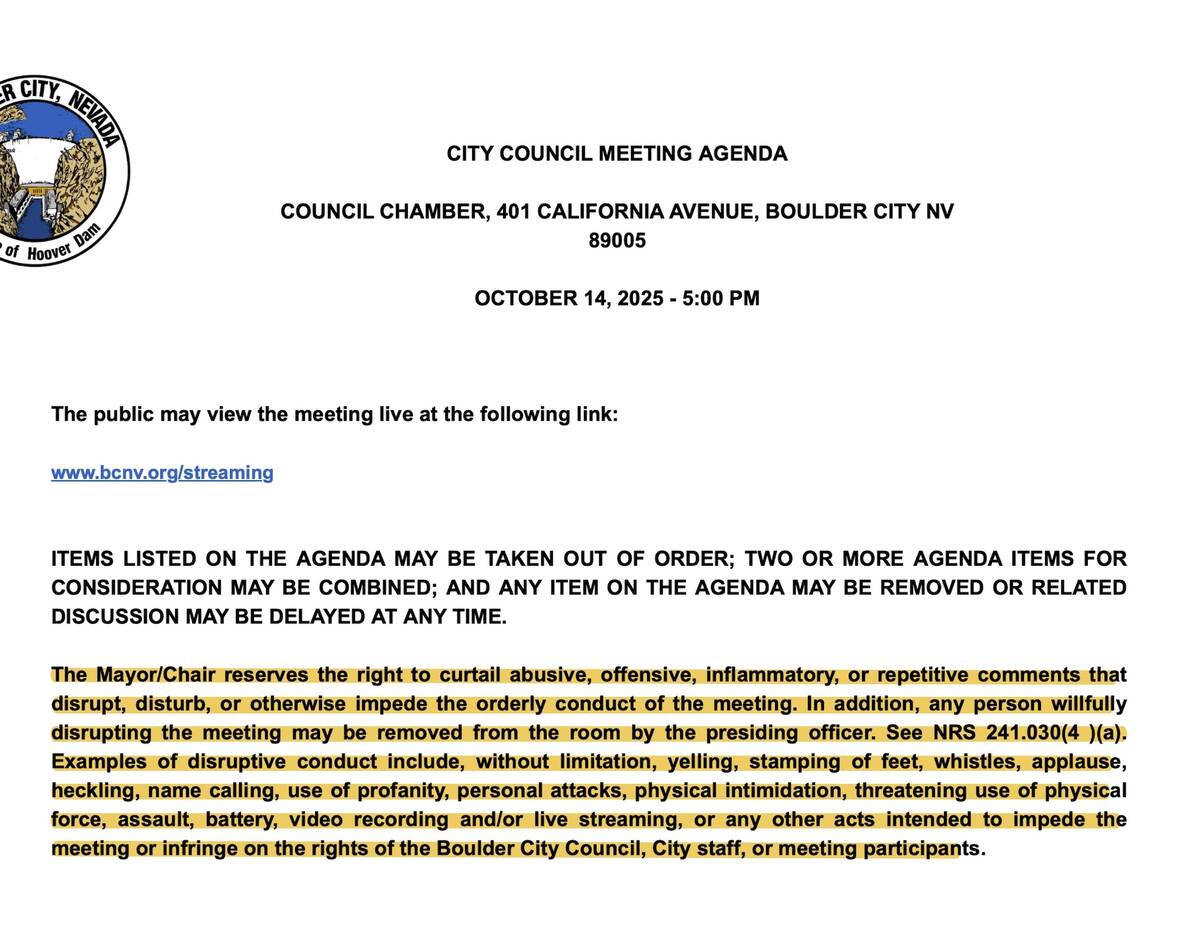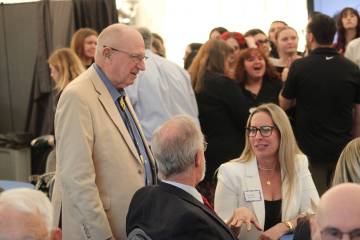New agenda language calls video recording ‘disruptive conduct’
Matt Di Teresa may be a member of perhaps the most important city body outside of the city council, but that does not mean he toes the city line.
The planning commission member, who is known for speaking his mind, got the ball rolling on the latest city controversy regarding communication when he posted a screenshot of new language that has been added to the agendas for all city meetings to the Facebook page of a Boulder City neighborhood group.
The new text, added between the standard notice that agenda items may be taken out of order, combined or removed and the “Call to Order” line reads as follows:
The Mayor/Chair reserves the right to curtail abusive, offensive, inflammatory, or repetitive comments that disrupt, disturb, or otherwise impede the orderly conduct of the meeting. In addition, any person willfully disrupting the meeting may be removed from the room by the presiding officer. See NRS 241.030(4 )(a). Examples of disruptive behavior include, without limitation, yelling, stamping of feet, whistles, applause, heckling, name calling, use of profanity, personal attacks, physical intimidation, threatening use of physical force, assault, battery, video recording and/or live streaming, or any other acts intended to impede the meeting or infringe on the rights of the Boulder City Council, city staff, or meeting participants.
“In my opinion, it is too vaguely worded and could allow anyone to be removed from any public meeting at city hall for any reason or no reason,” Di Teresa — who consented to having his post appear in the Review — wrote. “I believe that city gov’t should be striving for more openness and participation by the governed. This does the opposite.”
So what does the law actually say?
NRS 241 is what is generally referred to as the state’s “open meeting” law and it is among the most stringent laws of its type in the nation. Previous city councils prior to 2019 were actually found to have run afoul of the law on two different occasions and city council members had to sit through a remedial class on the subject. Twice.
Section 030 is actually the part of state code that deals with when a public body such as a city council can hold a closed meeting. It lays out the justifications for closed meetings. It addresses the fact that someone accused of misconduct can request that any meeting addressing those allegations be made open to the public.
Unlike what is implied by citing the law in the new agenda language, subsection 4(a) does not actually address what might be considered disruptive behavior. What it actually says is this:
4. This chapter does not: (a) Prevent the removal of any person who willfully disrupts a meeting to the extent that its orderly conduct is made impractical.
That’s it.
Online overviews of the basis for removal refer to federal case law from the Ninth Circuit Court of Appeals that confirms that officials may, “halt comments that are willfully disruptive, unduly repetitive, or stray from the agenda.”
Critically, a person’s removal cannot be based on the viewpoint of their speech. Disagreements or unpopular opinions are protected speech and do not constitute a disruption on their own.
When queried via email about the new language and especially the apparent ban on video recording or live streaming, city spokesperson Lisa LaPlante issued the following statement:
Nothing in the meeting agendas refers to “people being thrown out.” Rather, the new language simply distinguishes behavior that could disrupt or disturb a meeting and provides a list of examples. Moreover, the new information is not a change in the rules; the intent is to remind and clarify that decorum is required at public meetings. This language was added after a discussion among city clerks across Nevada about what should be included on agendas and best practices. Video recording and live streaming is not a disruption if done quietly and from the seats. Moving around the room or speaking into the camera during the meeting would be disruptive. The Chair has the authority to have someone removed if they cause a disruption.
LaPlante’s reference to a “discussion among city clerks” implies that the new language was a consensus. Indeed, Henderson uses verbatim the same language. However, North Las Vegas mentions disruptive behavior briefly (but not video recording) and Las Vegas makes no mention of disruptions at all.
The original query included a request for City Attorney Brittany Walker to address the legal basis for the list of “disruptive behaviors.” When reminded of this fact, especially in regard to the video questions, LaPlante responded, “There is nothing that says you can’t record or live stream. You can do so as long as it does not disrupt, impede or infringe on the rights of others.”
When it was pointed out that the language plainly states that video recording and live streaming are examples of disruptive behavior, LaPlante said, without addressing the actual language, “The act of recording or streaming would only be disruptive if someone was making excessive noise or movement.”
At 8:47 p.m. Tuesday, City Manager Ned Thomas sent an email saying, “The agenda language added in August provides a list of examples of potentially disruptive behaviors or acts.” He continued by noting that the language addresses intent and that it is up to the chair of any meeting to judge what behavior is or is not disruptive.
Walker did not reply to the original questions or offer any legal justification for the list of “disruptive” behaviors.















